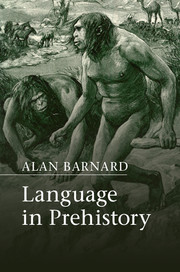Book contents
- Frontmatter
- Dedication
- Contents
- List of figures
- List of tables
- Preface
- 1 Introduction
- 2 Population diversity and language diversity
- 3 What did prehistoric people do?
- 4 How did prehistoric people think?
- 5 Narratives of the every-day
- 6 Mythological narratives
- 7 Sexual selection and language evolution
- 8 Conclusions and thoughts for the future
- Glossary
- References
- Index
4 - How did prehistoric people think?
Published online by Cambridge University Press: 05 November 2015
- Frontmatter
- Dedication
- Contents
- List of figures
- List of tables
- Preface
- 1 Introduction
- 2 Population diversity and language diversity
- 3 What did prehistoric people do?
- 4 How did prehistoric people think?
- 5 Narratives of the every-day
- 6 Mythological narratives
- 7 Sexual selection and language evolution
- 8 Conclusions and thoughts for the future
- Glossary
- References
- Index
Summary
Prehistoric people, of course, thought the same as any other people today. Or did they? There are, in fact, a number of relevant theoretical notions in social anthropology, including the original affluent society (Sahlins 1974), immediate-return economics (Woodburn 1980, 1982), the giving environment (Bird-David 1990), the foraging mode of thought (Barnard 2002) and universal kin categorization (Barnard 1978), as well as issues such as totemism (Lévi-Strauss 1969a) and the symbolic relations between animals and people (Willis 1974).
Israeli anthropologist Nurit Bird-David's work is especially interesting here. In a short paper in Current Anthropology (Bird-David 1990) she argues that the Nayaka, a hunter-gatherer group of southern India, perceive the environment differently than do people in the West. We take from or exploit our environment, whereas they think of their environment as ‘giving’ to them. This creates an entirely different way of thinking about economic and ecological relations, and one that may be more similar to understandings in prehistory than among non-hunter-gatherers today. In some of her other work, she takes on similar issues. The notion of ‘animism’ is misunderstood, because it is approached as a strange religious idea and not as a relational notion of personhood, where people and other beings share attitudes to the environment (Bird-David 1999). In a comparative study of Marshall Sahlins's notion of ‘original affluence’, she (1992) reformulates his theory of economic relations among hunter-gatherers with reference to three case studies: the Nayaka, the Mbuti of central Africa and the Batek of Malaysia. There are also understandings, like the own-kill rule, whereby one does not eat meat from animals one has killed but gives or exchanges them with others (Knight, Power and Watts 1995). All these anthropological ideas have profound implications for the origins of language.
Obviously, linguistic issues are also relevant. For example, there are differences in complexity among the languages that hunter-gatherers speak. Then there is the question of multilingualism, the theoretical consequences of the Whorfian hypothesis in its strong form and the peculiar case of Pirahã (Everett 2005): a South American language said to lack many common ‘universals’, including recursion. All these anthropological and linguistic issues have implications for the way hunter-gatherers think, and how they might perceive the world differently from non-hunter-gatherers.
But first, by way of background, let us consider briefly the ‘linguistic’ behaviour of animals.
- Type
- Chapter
- Information
- Language in Prehistory , pp. 51 - 72Publisher: Cambridge University PressPrint publication year: 2016



